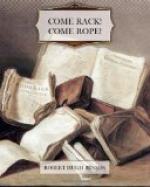“But ... but it is Mr. Audrey!” exclaimed Marjorie.
“Yes, my dear,” said Alice. “I know it is. But that does not mend your foot,” she said, with unusual curtness. And Marjorie saw that she still looked at her anxiously.
* * * * *
The three women dined together, of course, in an hour’s time. There was no escape from the pressure of circumstance. It was unfortunate that such an accident should have fallen out here, in the one place in all the world where it should not; but the fact was a fact. Meanwhile, it was not only resentment that Marjorie felt: it was a strange sort of terror as well—a terror of sitting in the house of an apostate—of one who had freely and deliberately renounced that faith for which she herself lived so completely; and that it was the father of one whom she knew as she knew Robin—with whose fate, indeed, her own had been so intimately entwined—this combined to increase that indefinable fear that rested on her as she stared round the walls, and sat over the food and drink that this man provided.
The climax came as they were finishing dinner: for the door from the hall opened abruptly, and the squire came in. He bowed to the ladies, as the manner was, straightening his trim, tight figure again defiantly; asked a civil question or two; directed a servant behind him to bring the horses to the parlour door in half an hour’s time; and then snapped out the sentence which he was, plainly, impatient to speak.
“Mistress Manners,” he said, “I wish to have a word with you privately.”
Marjorie, trembling at his presence, turned a wavering face to her friend; and Alice, before the other could speak, rose up, and went out, with Janet following.
“Janet—” cried the girl.
“If you please,” said the old man, with such a decisive air that she hesitated. Then she nodded at her maid; and a moment later the door closed.
III
“I have two matters to speak of,” said the squire abruptly, sitting down in the chair that Alice had left; “the first concerns you closely; and the other less closely.”
She looked at him, summoning all her power to appear at her ease.
He seemed far older than when she had last spoken with him, perhaps five years ago; and had grown a little pointed beard; his hair, too, seemed thinner—such of it as she could see beneath the house-cap that he wore; his face, especially about his blue, angry-looking eyes, was covered with fine wrinkles, and his hands were clearly the hands of an old man, at once delicate and sinewy. He was in a dark suit, still with his cloak upon him; and in low boots. He sat still as upright as ever, turned a little in his chair, so as to clasp its back with one strong hand.
“Yes, sir?” she said.
“I will begin with the second first. It is of my son Robin: I wish to know what news you have of him. He hath not written to me this six months back. And I hear that letters sometimes come to you from him.”




